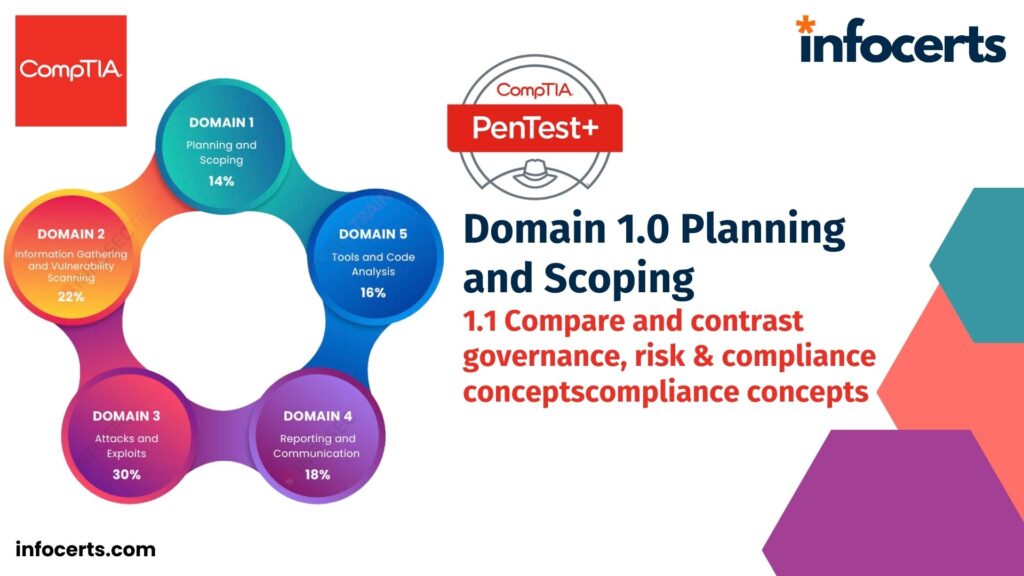Domain 1.0 Planning and Scoping
In the realm of cybersecurity, adherence to Regulatory Compliance standards is paramount. Organizations must ensure their systems are not only secure but also compliant with various regulations to protect sensitive data and mitigate risks effectively. In this blog post, we’ll delve into the crucial aspects of governance, risk, and compliance (GRC) as they relate to penetration testing, drawing insights from the CompTIA Pentest+ certification course.
Governance, Risk, and Compliance: Understanding the Trio
- Governance: Governance encompasses the policies, procedures, and decision-making processes that dictate how an organization operates. It involves defining roles and responsibilities, setting objectives, and ensuring compliance with regulations and standards.
- Risk: Risk refers to the potential for loss or harm resulting from vulnerabilities or threats. In the context of penetration testing, understanding and assessing risks help prioritize security measures and allocate resources effectively.
- Compliance: Compliance involves adhering to laws, regulations, and industry standards relevant to an organization’s operations. Non-compliance can lead to legal consequences, financial losses, and damage to reputation.
Regulatory Compliance Considerations
Penetration testers must navigate a myriad of regulatory requirements to ensure their assessments are thorough and compliant. Here’s a breakdown of some key considerations:
- Payment Card Industry Data Security Standard (PCI DSS): PCI DSS governs the security of payment card data, imposing requirements on organizations that handle such information. Compliance with PCI DSS is crucial for businesses to prevent data breaches and protect sensitive cardholder information.
- General Data Protection Regulation (GDPR): GDPR sets stringent rules for the protection of personal data of individuals within the European Union (EU). Penetration testers must ensure that systems handling EU citizens’ data comply with GDPR requirements to avoid hefty fines and penalties.
- Location Restrictions: Geographical considerations such as country limitations, tool restrictions, and local laws play a significant role in penetration testing. Testers must be mindful of legal and regulatory differences across jurisdictions to conduct assessments ethically and legally.
- Privacy Requirements: Privacy laws mandate the protection of individuals’ personal information. Penetration testers must adhere to privacy requirements, such as obtaining consent and safeguarding data, throughout the testing process.
Legal Concepts in Penetration Testing
Understanding legal concepts is essential for penetration testers to operate within the bounds of the law and avoid legal repercussions. Key legal documents include:
- Service-Level Agreement (SLA)
- Confidentiality Agreements
- Statement of Work (SoW)
- Non-Disclosure Agreements (NDAs)
- Master Service Agreements (MSAs)
Permission to Attack
Obtaining permission before conducting penetration tests is crucial to avoid disrupting business operations and causing unintended harm. Testers must seek explicit authorization from relevant stakeholders before initiating any assessments.
In conclusion, navigating regulatory compliance is integral to conducting effective penetration testing. By understanding the nuances of governance, risk, and compliance, professionals can execute assessments that not only identify vulnerabilities but also ensure adherence to legal and regulatory standards.
Infocerts, your trusted partner in cybersecurity education, offers comprehensive training programs, including the CompTIA Pentest+ certification course. Enroll today to enhance your skills and stay ahead in the ever-evolving field of cybersecurity. Contact us at +91 70455 40400 to learn more!
This blog post effectively covers the essential aspects of regulatory compliance in penetration testing, incorporating relevant details from the CompTIA Pentest+ course. Let me know if you need further adjustments or additional information!

